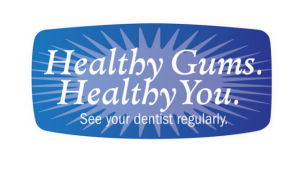Taking care of your teeth and gums can help reduce your risk of heart disease and other serious medical conditions!

- People with gum disease are almost twice as likely to suffer from heart disease as those without gum disease.
- Many of the risk factors for gum disease are the same as those for heart disease and stroke: such as tobacco use, poor nutrition and diabetes.
- Gum disease is caused by plaque buildup along and below the gum line. Bacteria from infected gums can extricate, enter the bloodstream, attach to blood vessels and increase clot formation; which in turn decreases blood flow to the heart, causing blood pressure to rise and increasing the risk of a heart attack.
Awareness of the following possible warning signs of gum disease:
- Red, swollen or tender gums
- Bleeding while brushing or flossing
- Gums that pull away from the teeth
- Loose or separating teeth
- Persistent bad breath
For a bright, healthy smile:
- Floss daily.
- Brush your teeth twice a day.
- Schedule regular dental cleanings.
- Replace your toothbrush every three months—or sooner if the bristles become bent.
While most people are aware that lifestyle choices such as eating right, getting enough exercise and quitting smoking can help prevent cardiovascular disease, they may not know that by just brushing and flossing their teeth each day, they might also be avoiding this potentially lethal condition.

For a healthy, beating heart:
- Don’t smoke. If you do smoke, try to quit.
- Maintain a healthy weight through diet and exercise.
- Control blood pressure.
- Practice relaxation methods, such as meditation or yoga.
- Stay active
Keys changes for patients with highest risk of infective endocarditis
Antibiotics before dental procedures are only recommended for patients with the highest risk of infective endocarditis, those who have:
- A prosthetic heart valve or who have had a heart valve repaired with prosthetic material.
- A history of endocarditis.(inflammation of the inner layer of the heart)
- A heart transplant with abnormal heart valve function
- Certain congenital heart defects
If you have a history of any cardiovascular (heart & artery) disease, it’s noteworthy to let your dental professional know as it may require them to adjust the type of treatment you are receiving. Be sure to keep them up to date with prescription or over-the-counter medicine you are taking—including any supplements, vitamins or herbal pills as your dentist might ask you to stop taking something before a specific treatment.
STAY FIT! KEEP SMILING



